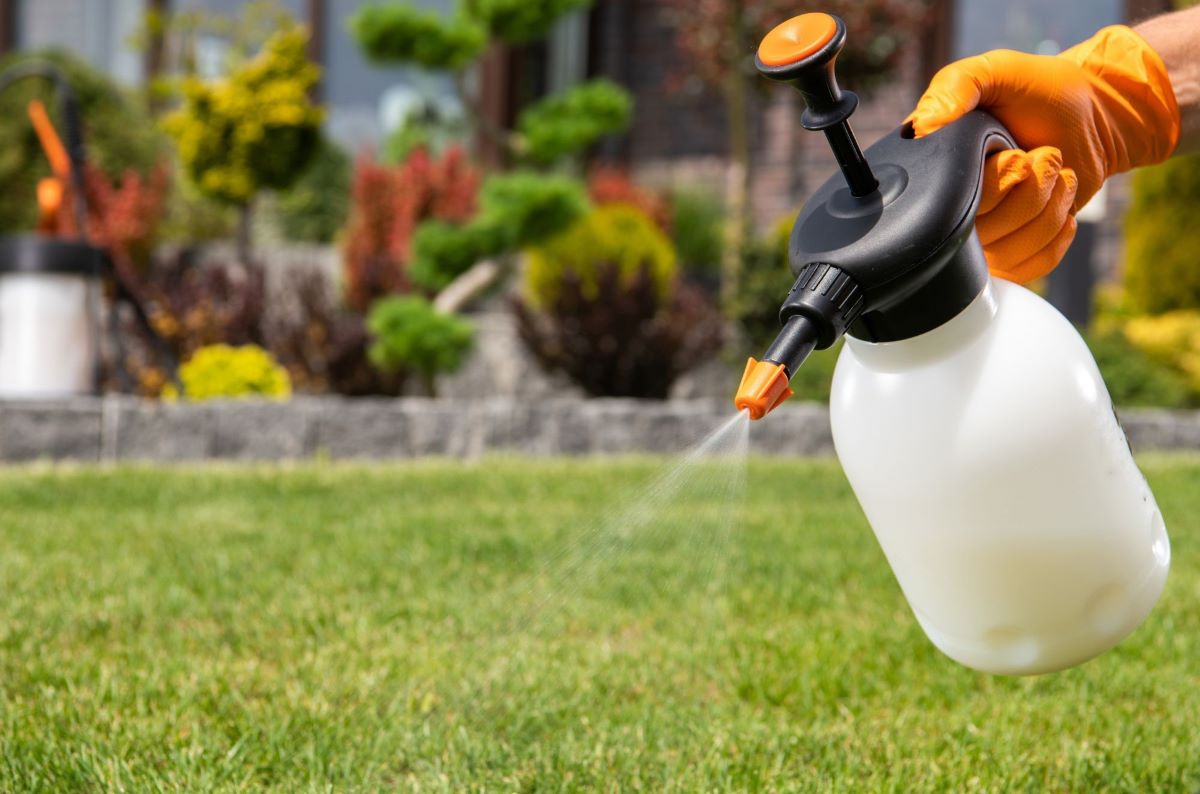


Select one of the options below:

CSU Extension's program stands out for its comprehensive learning content that covers essential aspects of pest management strategies, pesticide properties, environmental and public safety considerations, applicator safety, and the relevant laws and regulations specific to Colorado.
Our goal is to prepare learners for the Colorado licensing exam, provide Continuing Education Credits (CECs) to certified applicators, and provide technician classroom training.
Online Asynchronous Format
Learn at your own pace with our flexible, self-paced online format. No need to compromise your schedule – fit your education around your life.
Robust and Comprehensive Content
Delve into a wealth of knowledge curated by experts, ensuring you are well-versed in pesticide application and safety practices.
Colorado-Specific Content and Application Regulations
CSU Extension’s course is tailored to Colorado's unique environment and regulations, providing practical insights for both agricultural and residential settings within the state.
This course is designed for people seeking commercial and private applicator licenses in Colorado. Our goal is not only to provide essential knowledge but also to fully prepare learners for the Colorado general licensing exam. This course may be used to fulfil Colorado pesticide technician classroom training requirements. The content covered includes pest management strategies, pesticide properties, environmental and public safety considerations, applicator safety, information on making applications, and the laws and regulations pertaining to pesticide applicators.
This course prepares you for roles such as qualified supervisor, certified operator, and private applicator, and provides helpful information for navigating the examination and licensing process.
Continuing education courses not only keep your license up to date but also sharpen your emergency and safety practices, provide insights for effective application strategies, and keep you informed about the latest environmental and regulatory changes affecting pesticide applicators. We offer six specialized continuing education courses (CECs) that fulfill the seven core credits that every private applicator, qualified supervisor, and certified operator are required to have to renew their license. We also offer continuing education for Category 101: Agricultural Insect Control.
Our continuing education courses are approved by the Colorado Department of Agriculture. They cover topics like pesticide resistance management, requirements surrounding the endangered species act, pesticide spills and emergency response, respiratory protection, regulatory compliance in Colorado, and planning an application using a label.
For the best pricing, enroll in a 7 credit bundle, which includes:
In this course, students will learn about integrated pest management (IPM) and compare control strategies for three of Colorado’s current and emerging economically significant insect pests. Students will learn to distinguish these pests from other common pests and identify symptoms of infestation in host plants.
This course is approved by the Colorado Department of Agriculture. By completing this course, you will earn 1 continuing education credit under the subject area of Agricultural Insect Control (Category 101).
Certified pesticide applicators must complete ongoing education to keep their licenses active. Attending educational classes or workshops helps private and commercial applicators stay up to date with evolving technologies.
These classes offer valuable insights on pest control, environmental and personal safety, advancements in pest management techniques, and updates to pesticide regulations, supporting applicators as they make safe and effective pest management decisions.
Here are some details about renewing private and commercial licenses:
Explore common label, regulatory, and Worker Protection Standard violations by pesticide applicators in Colorado and equip yourself with the knowledge and methods to avoid them. You will also be updated on changes to testing, licensing, and regulations. By completing this course, you will earn 2 continuing education credits in Laws and Regulations.
Test your label knowledge, find and utilize helpful resources, and stay up to date on evolving label language and requirements through engaging exercises based on a real-world scenario. By completing this course, you will earn 1 continuing education credit in Use of Pesticides.
Learn to navigate respiratory protection requirements and ensure proper use of personal protective equipment as outlined on pesticide labels and by federal law. By completing this course, you will earn one continuing education credit under the subject area of Applicator Safety.
Equip yourself with essential knowledge and skills for effectively managing pesticide spills and responding to accidental exposures. It covers topics of spill cleanup and emergency response protocols and prioritizes prevention strategies and practices to help you protect yourself, your employees, and your business. By completing this course, you will earn 1 continuing education credit in Public Safety.
Explore the impact of the Endangered Species Act on pesticide regulation and gain the skills to understand label requirements for endangered species protection. By completing this course, you will earn one continuing education credit under the subject area of Environmental Protection.
Discover how pesticide modes of action can influence resistance management and learn techniques to delay resistance and maintain efficacy. By completing this course, you will earn one continuing education credit under the subject area of Pesticides and Their Families.
Learn about integrated pest management (IPM) and compare control strategies for three of Colorado’s current and emerging economically significant insect pests. Students will learn to distinguish these pests from other common pests and identify symptoms of infestation in host plants.
These courses offer a cost-effective way to meet your continuing education requirements as your schedule allows.
Our training is designed for Colorado certified commercial and private pesticide applicators seeking continuing education, applicators preparing for a pesticide applicator certification, and technicians needing annual classroom training. Learners who complete all module quizzes are eligible to earn an electronic certificate of completion upon request.
Upon completing CSU Extension's Pesticide Application and Safety Basics course, you position yourself for the role of a certified pesticide applicator in Colorado, unlocking opportunities in agriculture, landscaping, and related industries. This course provides a fundamental knowledge base, equipping you for the pivotal roles listed below. Continuing Education Credit (CEC) courses build on the foundation of the basics course and allow you to renew your licensure without having to repeat your licensure exam.
These courses are aimed at people who are in, or seeking to be in the following roles:
Qualified Supervisor:A person working for or on behalf of a commercial, limited commercial, or public applicator, engaging in activities such as independently assessing pest issues, suggesting pest controls involving pesticides or devices and handling the mixing, is required to hold a license as a qualified supervisor. To qualify for this license, a Qualified Supervisor must fulfill specific on-the-job experience requirements tailored to each licensure category.
Certified Operator:An individual employed by or representing a commercial, limited commercial, or public applicator, utilizing restricted-use pesticides without on-site supervision from a qualified supervisor, is required to hold a license as a certified operator. Obtaining this license does not entail any experience requirements.
Private Applicator:An individual who utilizes or oversees the application of a restricted-use pesticide to produce an agricultural commodity on property owned or leased by the applicator or their employer, or, if the application involves no compensation other than the exchange of personal services between agricultural commodity producers, on another person's property, is required to obtain a license as a private applicator.

Lisa is the Director of the Colorado Environmental Pesticide Education Program (CEPEP) and the Administrator for the Pesticide Regulatory Education Program (PREP). As a pesticide safety educator, she delivers pesticide safety Train-the-Trainer programs for those who train fieldworkers and pesticide handlers throughout the state. She oversees the revision of study guides and exams for applicators seeking their private and commercial applicator certificates and licenses, delivers continuing education programs for pest management professionals statewide, and teaches an undergraduate course, Understanding Pesticides.

Hannah works for CEPEP developing and editing educational content for pesticide applicators and agricultural workers. Before working for CEPEP, she was a course coordinator for a continuing education program and more recently coordinated agricultural research at one of CSU’s agricultural experiments stations.
For questions about curriculum, please contact: PesticideSafety@colostate.edu.
For questions about course registration, contact: Outreach_Team@colostate.edu.